Is Canada’s amazing house price boom coming to an end?
House prices in Canada’s eleven major cities rose by a modest 2.51% during 2018 (0.51% inflation-adjusted).
This is a sharp slowdown from last year´s 8.92% rise. And in the last quarter of 2018, house prices fell 0.95% (-0.73% inflation-adjusted), against the backdrop of rising interest rates and a slowing economy.
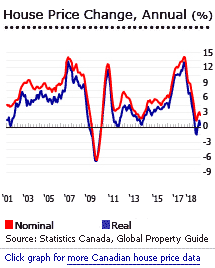
Demand is now falling. Construction is weakening. Sales plunged 19% in December 2018 from a year earlier, according to the Canadian Real Estate Association (CREA).
According to CREA:
- Apartment prices posted year-on-year gains of 4.85% - but last year they rose 19.68%!
- Townhouses/row houses rose 3.06% - but last year they rose 12.07%!
- The average price of a one-storey single family home fell 0.27%, while two-storey homes rose 0.39%.
- Victoria’s house prices recorded the biggest year-on-year rise of 5.95% during 2018, followed by Ottawa (5.87%), Hamilton (4.4%), Montreal (4.37%), Toronto (3.72%) and Vancouver (1.41%).
- There were house price falls in Calgary (-2.64%), Edmonton (-1.87%), Winnipeg (-0.49%), Quebec (-0.14%) and Halifax (-0.04%).
The central bank has taken action repeatedly – raising mortgage downpayment requirements and reducing amortization periods – but till now, prices spiralled up. However January 2018´s squeeze is proving effective. House price rises are decelerating sharply.
“While economic and demographic fundamentals remain supportive for housing demand in many parts of the country, policy headwinds together with rising interest rates are limiting access to mortgage financing and negatively impacting homebuyer sentiment,” said CREA.
The Canadian economy expanded by 2.1% in 2018, a slowdown from the preceding year’s 3% growth, mainly due to its ailing oil and gas industry. Bank of Canada expects economic growth to slow further to 1.7% this year before partially rebounding to 2.1% in 2020.
There are virtually no restrictions on foreigners buying properties in Canada.
A long and steady boom
Canada escaped the major post-2008 collapse in house prices which took place in Europe and the U.S. But the situation looks worrying. House prices have risen almost continuously for 16 years:
- From Q1 2000 to Q1 2009, house prices rose by 79% (49% inflation-adjusted), due to low interest rates and economic growth.
- From Q2 2009 to Q3 2012, house prices increased by another 24% (17% inflation-adjusted), despite government efforts to cool the housing market.
- From Q4 2012 to Q4 2015, tighter mortgage rules implemented in July 2012 helped calm the market, but house prices still rose by around 15.7% (10.8% inflation-adjusted).
- From 2016 to 2017, house prices surged by 22.5% (18.5% inflation-adjusted).
However there are signs that the great Canadian house price boom is coming to an end, after repeated moves to tighten mortgage lending. House price rises are now decelerating sharply, amidst falling demand and slowing construction activity.
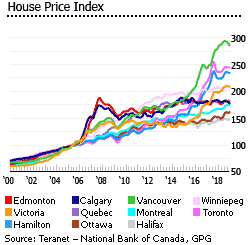
House price rises and demand now slowing
House price rises are expected to continue to slow this year. The national average price is forecast to increase slightly by 1.7% y-o-y to CA$496,800 (US$373,885) in 2019 from a year earlier, according to CREA’s Quarterly Forecasts.
However, there are significant regional variations:
- Ontario is expected to post the biggest annual rise in house prices of 3.3% during 2019, to an average of CA$588,900 (US$443,198).
- House prices are also expected to increase modestly by 3% in New Brunswick, 2.9% in Quebec, by 2.4% in Nova Scotia and by 1.6% in Prince Edward Island.
- House prices in British Columbia and Manitoba are projected to increase by a meagre 0.9% this year, at CA$720,000 (US$541,863) and CA$293,300 (US$220,734), respectively.
- In contrast, Saskatchewan is expected to register the biggest y-o-y decline in house prices of 3.5% this year, to an average of CA$276,900 (US$208,391), followed by Newfoundland (-3.4%) and Alberta (-2.5%).
Home sales falling
In December 2018, actual sales activity plunged by 19% from a year earlier, according to CREA, led overwhelmingly by lower activity in Lower Mainland of British Columbia, the Okanagan region, Calgary, Edmonton, the Greater Toronto Area and Hamilton-Burlington.
The sales decline was partly due to the elevated activity in the previous year as homebuyers rushed to purchase in advance of the new federal mortgage stress test that became effective on January 1, 2018.
Newfoundland is forecast to see the largest decline in sales in 2019 at 7.1%, followed by British Columbia (-5.2%), Nova Scotia (-4.3%) and Alberta (-3.2%). Home sales are expected to fall less in Saskatchewan (-2.5%), Prince Edward Island (-2%) and Manitoba (-0.7%). On the other hand, sales activity is expected to increase modestly in New Brunswick (3.2%), Quebec (2.2%), and Ontario (1.4%).
“National sales are forecast to remain little changed in 2019 (456,200 units; -0.5%), as rising interest rates combined with the mortgage stress-test offsets continuing population, job and income growth,” said CREA.
Residential construction activity weakening
Dwelling starts fell by 3.1% to 212,843 units in 2018 from a year earlier, according to CMHC.
By property type:
- Apartments: up 9.6% y-o-y in 2018 to 112,401 units
- Single family homes: down 14.2% y-o-y to 65,940 units
- Semi-detached houses: down 10.6% y-o-y to 10,992 units
- Row houses: down 16.2% y-o-y to 23,510 units
On the other hand, dwelling completions increased 4.9% y-o-y to 200,262 units last year.
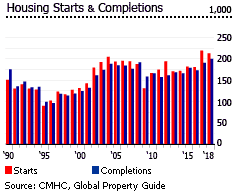
Ontario accounted for about 37% of all dwelling starts in Canada in 2018, followed by Quebec (22%) and British Columbia (19%), according to CMHC’s recent report.
Mortgage interest rates are rising
Mortgage interest rates are now rising gradually in Canada.
- Interest rates on 1-year mortgages averaged 3.64% in January 2019, up from 3.34% a year earlier and 3.14% two years ago.
- Interest rates on 3-year mortgages averaged 4.29% in January 2019, up from 4.15% in January 2018 and 3.39% in January 2017.
- Interest rates on 5-year mortgages averaged 5.34% in January 2019, up from 5.14% a year earlier and 4.64% two years ago.
In October 2018, the central bank raised its key rate by 25 basis points to 1.75%, the fifth consecutive rate hike since July 2017, in an effort to keep the economy from overheating and curb inflationary pressures. The key rate had been raised by 25 basis points each in July 2017, September 2017, January 2018, and July 2018.
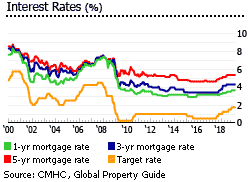
Despite this, the mortgage market continues to expand. In November 2018, the amount of residential mortgage debt outstanding rose by 3.2% to CA$1.54 trillion (US$1.16 trillion) from a year earlier, according to Statistics Canada. The size of the mortgage market expanded strongly in recent years, rising from 39.8% of GDP in 2000, to 54.2% of GDP in 2008, to 63.3% of GDP in 2014 and finally to about 69% of GDP in 2018.
New market cooling measures
In October 2017, the Office of the Superintendent of Financial Institutions (OSFI) introduced another set of cooling measures targeting borrowers in the uninsured mortgage market, requiring lenders to test borrowers’ ability to pay higher interest rate than the one they have actually been offered, to test their creditworthiness if borrowing costs rise.
The new measures, which came into effect on January 1, 2018, apply to all federally regulated financial institutions.
- OSFI is setting a new minimum qualifying rate, or "stress test," for uninsured mortgages. The minimum qualifying rate is now the five-year benchmark rate published by the Bank of Canadaor the contractual mortgage rate +2%, whichever is higher.
- OSFI is requiring lenders to enhance their loan-to-value (LTV) measurement and limits so they will be dynamic and responsive to risk.
- OSFI is placing restrictions on certain lending arrangements that are designed to circumvent LTV limits.
The new stress test requirement disqualifies about one in every five potential buyers, reducing property demand, according to a survey conducted by the Mortgage Professionals Canada.
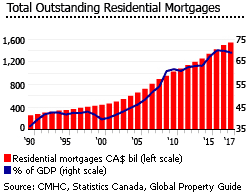
This followed measures introduced in 2016 to discourage speculation:
- From August 2, 2016, foreign nationals and foreign-controlled companies were required to pay 15% in additional property transfer tax on residential property transfers in Greater Vancouver. A 15% tax is equivalent to around CA$300,000 on the sale of a CA$2 million home.
- From October 17, 2016 homebuyers who made greater than 20% down payments, faced the same insurance requirements as those with lower down payments.
- While any financial gain from selling a primary residence remains tax-free, the government now requires sellers to report the sale at tax time to the Canada Revenue Agency.
- The government has also launched consultations on limiting the government´s financial obligations in the event of widespread mortgage defaults.
Other market-tightening measures date back to July 2012, with a significant ratcheting-up of pressure in 2013 and 2014. Till this year none of these measures had much effect.
Rents rising modestly, rental yields remain healthy
Gross rental yields in Montreal remain healthy, ranging from 4% to 6% in early 2018, according to Global Property Guide research. A small apartment of 60 sq. m. in Montreal offers a return of around 6%. In this low-return era, in a low-risk country such as Canada, that is a really acceptable, not to say enticing, yield. Even on a largish 120 sq. m. apartment in Montreal, one can likely earn a gross rental return of 4.5%.
In Toronto, rental yields are lower, which range from 3.5% to 5.3% in early 2018.
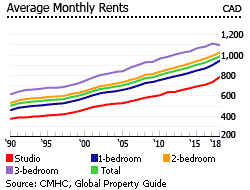
Average rents in Canada rose by 3.4% to CA$987 per month (US$743) during the year to October 2018, according to the CMHC. British Columbia had the highest rent increase, up by 6.1%, followed by Ontario (4.8%), and Manitoba (3.9%). More modest rent rises were seen in New Brunswick (3%), Prince Edward Island (2.9%), Quebec (2.4%), Nova Scotia (1.9%), Alberta (1.6%), and Newfoundland and Labrador (1.2%).
Vancouver had the highest average monthly rent for two bedroom apartments of CA$1,649 (US$1,242) in October 2018, followed by Toronto with monthly rent of CA$1,467 (US$1,105) and Calgary with monthly rent of CA$1,272 (US$958). Trois-Rivières, Saguenay, and Sherbrooke – all Quebec centres – registered the lowest monthly rents in October 2018 of CA$601 (US$452), CA$608 (US$458) and CA$639 (US$481), respectively.
Vacancy rates are falling
The national vacancy rate was 2.4% in 2018, down from 3% in 2017, 3.7% in 2016 and 3.5% in 2015, according to the CMHC. It is considered very low by international standards. Because of skyrocketing house prices in recent years, an increasing number of Canadians have no choice but to rent.
In 2018:
- Bachelor-type: 2.9%, down from 3.5% a year earlier
- One-bedroom: 2.4%, down from 2.9% a year earlier
- Two-bedroom: 2.4%, down from 3% a year earlier
- Three-bedroom: 1.8%, down from 3% a year ago
“The decrease in the vacancy rate was attributable in part to the strong increase in international migration,” said Ale dab Iorwerth, the deputy chief economist of CMHC. “This factor, combined with the growth in youth employment and the aging of the population, drove up demand for rental housing.”
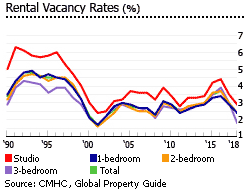
Prince Edward Island had the lowest vacancy rate in Canada of just 0.3% in 2018, followed by British Columbia (1.4%), Ontario (1.8%), Nova Scotia (2%), and Quebec (2.3%). On the other hand, Saskatchewan had the highest vacancy rate, at 8.7% in 2018, followed by Newfoundland and Labrador (6%), Alberta (5.5%%), and New Brunswick (3.2%).
Oilpatch woes adversely affecting the Canadian economy
The Canadian economy was estimated to have expanded by 2.1% in 2018, a deceleration from the preceding year’s 3% growth, mainly due to the slowing oil and gas industry.
“Here in Canada, lower oil prices have reached the point where they will have material consequences for our macroeconomic outlook,” said Bank of Canada governor Stephen Poloz.
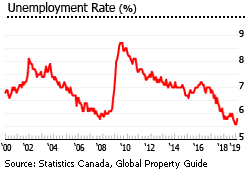
Canada’s oil industry accounts for about 10% of the country’s GDP. Canada has the world’s third largest oil reserves and is the world’s fifth largest oil producer and fourth largest oil exporter.
Oil price gap between Canadian crude and US benchmarks hit new records in October 2018, topping US$50 per barrel, mainly due to rising oil production, export bottlenecks and American refinery maintenance. In an effort to clear the oil glut, Alberta, Canada’s largest oil producing province, began to enforce mandatory production cuts on its largest oil producers in January 2019.
Bank of Canada expects that the country’s economic growth will slow further to 1.7% this year before partially rebounding to 2.1% in 2020.
The government has increased spending on infrastructure, cut some taxes, and increased child benefits, among others.
The downside is that the budget deficit is now swelling. For the 2019-20 fiscal year, the Canadian government is projected to post a deficit of CA$19.6 billion (US$14.8 billion), sharply up from a deficit of just CA$1 billion (US$754 million) four years ago. The federal government has run deficits every year since 2015, despite continued economic growth.
In November 2018, government debt stood at CA$671.7 billion (US$506.7 billion), up 4.8% from a year earlier, according to Statistics Canada.
The country’s annual inflation rate stood at 2% in December 2018, up from 1.9% a year earlier, as higher food and phone services costs offset lower gasoline prices, according to Statistics Canada. For the whole year of 2018, inflation accelerated to 2.3%, up from 1.6% in 2017 and the highest level in seven years.
In January 2019, the nationwide unemployment was 5.8%, up from 5.6% in the previous month but down from 5.9% a year earlier. British Columbia had the lowest jobless rate of 4.7%, followed by Quebec (5.4%), Manitoba (5.5%), Saskatchewan (5.5%) and Ontario (5.7%). Newfoundland and Labrador had the highest jobless rates in January 2019, at 11.4%.
An influx of immigrants buoys property demand
In an effort to fill the gap left by retiring baby boomers, Canada liberalized its immigration regulations in 2015. As a result, Canada took in more than 323,000 immigrants in the 2015-16 fiscal year, the largest number since 1910, according to Statistics Canada. During the latest fiscal year, the Canadian government targets to accept about 310,000 immigrants, after admitting about 273,000 immigrants in FY 2016-17 and 303,000 immigrants in FY 2017-18.
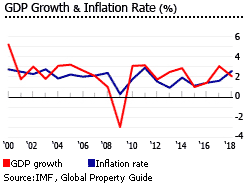
In November 2017, Canada’s Minister of Immigration, Refugees and Citizenship Ahmed Hussen unveiled the government’s plan to let a million new immigrants over the succeeding three years, in an effort to fulfill the country’s economic needs. The plan, dubbed as "Growing Canada’s Economic Future", aims to increase the number of new immigrants to 310,000 in 2018, 330,000 in 2019, and 340,000 in 2020.
"This historic multi-year immigration levels plan will benefit all Canadians because immigrants will contribute their talents to support our economic growth and innovation, helping to keep our country at the forefront of the global economy," said Hussen.
In October 2018, the government unveiled an updated multi-year immigration plan that includes a target of about 350,000 new immigrants in 2021, which is nearly 1% of its population.
About five million Canadians are set to retire by 2035.
"Nothing is going to impact this country besides increased automation and technology more than immigration will and this impact will grow in response to declining birth rate, aging population and accelerated retirements," said Chris Friesen, director of the Canadian Immigrant Settlement Sector Alliance.
cottage rentals ontario, cottages in canada, cottage rentals, ontario cottage rentals, cottages for sale ontario, cottage rental ontario, cottages for sale, cottagesincanada, muskoka cottage rentals, cottage for sale ontario, cottages for rent ontario, cottages for rent, cottage rentals muskoka, tobermory cottages, ontario cottages for sale, cottages in ontario, ontario cottages, cottages, cottages canada, canada cottages, cabin rentals bc, cottage for rent ontario, grand bend cottage rentals, cottage in canada, cottage for sale, pei cottage rentals, cottages for sale in ontario, cottage rentals in ontario, cottage rental, chalet a louer quebec, chalet a louer laurentides, tobermory cottage rentals, sauble beach cottage rentals, cottages ontario, cottage rentals near ottawa, cottage, cottage ontario, blue mountain cottages, chalet a louer laurentide, chalet a louer, cottages for rent muskoka, cottage rental muskoka, cottage rentals nova scotia, cottage rentals pei, cottage rentals kawarthas, cabins for rent in bc, pei cottages, wasaga beach cottage rentals, kawartha cottage rentals, wasaga beach cottages, rice lake cottage rentals, cottage canada, rent cottage ontario, waterfront cottages for sale, prince edward county cottage rentals, cabin rentals manitoba, cottages for rent near ottawa, cottages nova scotia, port stanley cottage rentals, long point cottage rentals, nova scotia cottage rentals, cottagesincanada com, muskoka rentals, cottages in muskoka, rent a cottage ontario, cottages in nova scotia, muskoka cottages, cottage for rent, chalet a louer shediac, chalet nouveau brunswick, cottage rentals quebec, private cottage rentals ontario, cabin for sale ontario, muskoka cottage rental, chalet quebec, cabin rentals alberta, manitoba cabin rentals, alberta cabin rentals, quebec cottage rentals, cottages in pei, muskoka cottage, bruce peninsula cottages, cottages for sale northern ontario, sandbanks chalet, cabin rentals ontario, parry sound cottage rentals, cottage rentals tobermory, sauble beach cottages, bc cabin rentals, rice lake cottages, ontario cottage rental, waterfront cottages for sale ontario, cottages for sale nova scotia, chalets a louer laurentides, georgian bay cottage rentals, crystal beach cottages, pei cottage rental, cottages for sale eastern ontario, chalet a vendre, chalet à louer cantons de l'est, cottage rental nova scotia, cottage rentals prince edward county, chalet shediac, cottage foreclosures ontario, lakefront cottages for sale ontario, cottages in tobermory, crystal beach ontario, weekend cottage rentals ontario, cabin rental alberta, cottages pei, chalet laurentides, bruce peninsula cottage rentals, pei cottages for rent, cheap cottage rentals ontario, waterfront cottages for rent in ontario, cottage rentals grand bend, location chalet, turkey point cottages, cottages for rent pei, manitoulin island cottage rentals, manitoulin island cottages, cottage rentals wasaga beach, nova scotia cottages, kawartha lakes cottage rentals, french river cottage rentals, cottages for sale in ontario under $100 000, lake erie cottage rentals, ontario cottage for sale, cottages for sale kawarthas, collingwood cottages, chalet mont tremblant, crystal beach, bayfield cottage rentals, chalet a louer outaouais, ontario cottage rentals by owner, grand bend cottages, wasaga beach cottage rental, muskoka cabin rentals, cabins for rent alberta, cottages for rent in ontario, ontario cottage, turkey point cottage rentals, tobermory rentals, eastern ontario cottage rentals, chalet ontario, kincardine cottage rentals, cheap cottage rentals, cherry beach resort, kenora cabin rentals, oceanfront cottages nova scotia, cottage sale ontario, parry sound cottages, lake huron cottage rentals, cabin rentals, tobermory cottage rental, cottage for sale in ontario, algonquin cottage rental, chalet a louer nouveau brunswick shediac, chalets au quebec, tobermory cottage, rent a cottage, sauble beach rentals, location chalet quebec, calabogie cottage rentals, waterfront property for sale ontario, cottages to rent, cottage rental prince edward county, wasaga beach cottage, ontario cottages for rent, cottages near ottawa, cottages rentals ontario, cottage rental near ottawa, prince edward county cottages, shediac cottages, cottage rental tobermory, waterfront cottage rentals, weekend cottage rentals, french river cottages, power sale cottages ontario, chalet à louer laurentides, northern ontario cottage rentals, haliburton cottage rentals, wasaga beach rentals, huntsville cottage rentals, location chalet laurentides, cottage in ontario, cottages in ontario for sale, chalet à louer nouveau brunswick, cottages for rent in port stanley, new brunswick cottage rentals, buckhorn cottage rentals, charleston lake cottage rentals, canada cottage rentals, waterfront property for sale, cottage rentals canada, cabins for rent ontario, cottages ns, cabins in ontario, crystal beach cottage rentals ,canadian tire, apple, financial post, finance, dollarama, tuango, toys r us canada, scotiabank, gm, national post, toronto housing market, tsx, aphria stock, bombardier, payless canada, reuters, knowledgehook, forever 21, canada, nafta news, fedex, payless shoes canada, tsx today, forever 21 canada, canada post strike, canada housing, toronto real estate, bank of canada, oil, canadian dollar, real estate, toronto real estate news, babies r us canada, best buy canada, roots canada, polaris, nafta, investing, deciem, fizz, toronto real estate market, indextsi:osptx, stock market, the brick, petsmart canada, financialpost, vancouver housing market, cpa canada, oas, gaz metro, home capital group, q, the national post, popeyes chicken, investment calculator, hip stock, business news, bmo, real estate news, aphria, paybyphone, air transat, bdc, cravetv, sears canada news, weed stock, cpa, toysrus canada, housing market, marijuana stocks, tgod, bombardier news, bloomberg news, costco, roku canada, maxime bernier, home capital, canada housing market, stock market news, the brick furniture, housing market toronto, payless shoes, bank of montreal, canadian housing market, bmoinvestorline, costco hours, twelve barrels, aimia, sears liquidation, pof, westjet strike, calgary news, tuition tax credit, apotex, the brick canada, business, wind, newstrike stock, oil prices, marijuana, blackberry, tdot performance, quadrigacx, shaw, entrepreneur, equifax canada, nova chemicals, hbc, instacart canada, purolator, canada economy, environment, goldcorp, ceridian, trans mountain pipeline, crescent point energy, olympia trust, adm, mawer, meng wanzhou, much music, weed stocks canada, oxford properties, cp rail, michaels canada, bmo investorline, hydropothecary, equitable bank, cannabis, mine, velofix, logistik unicorp, bitcoin canada, ontario cannabis store, hudson bay, hillberg and berk, canada real estate, lightspeed, money, brandon truaxe, ocs canada, dalton mcguinty, national post news, the financial post, enbridge income fund, tfsa limit, prometic life sciences, oil news, kinder morgan, canadian stock market, tourmaline, natural gas prices, fyre festival, newstrike, canadian economy, toronto real estate board, cobs bread, vmedia, saputo, tweed, markets, couche tard, bear, phazon, investor, husky energy, tahoe resources, the abnormal beauty company, blackberry news, victoria secret canada, prem watsa, bank of canada interest rate, cannabis stocks, teavana canada, david's tea, oas clawback, ontario minimum wage, indextsi: osptx, altitude sport, dollarama stock, nuuvera, iristel inc, income splitting canada, lululemon canada, ll bean canada, canada financial news, snc lavalin news, value village, kathleen wynne, stornoway diamond, vancouver real estate news, rrsp, obsidian energy, llbean canada, canadian tire online shopping, roll up the rim, valeant, rogers cable, nexen
Sources: